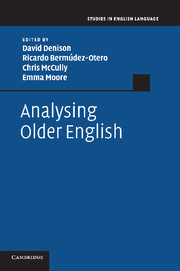General introduction
Published online by Cambridge University Press: 05 December 2011
Summary
Is the past a foreign country?
At one stage in the planning of this book, our projected title was a question adapted from the famous opening of L. P. Hartley’s novel The Go-Between: ‘The past is a foreign country; they do things differently there.’ Doing things differently is not supposed to be true of speakers (the uniformitarian principle asserts that the general properties of language do not vary over historical time), but might it be true of linguists? Does a historical linguist need different methodological and theoretical tools from those employed by a general linguist? In the actual title we settled on, ‘Older English’ simply means the entire spectrum of historical English, though the balance is probably weighted away from the present day. This book is an exploration of problems in the analysis of past states of a language, the intricacies of handling complex but always incomplete data, the theoretical questions which must be posed in historical and diachronic linguistics, and in particular whether the synchronic analysis of an earlier state of English must be, or can be, or indeed must not be, different in kind from an analysis of present-day language.
To this end, in early 2007 we invited a number of authorities on different aspects of the history of English to contribute to a themed volume. We had an excuse for planning the book at that particular time. Our friend Richard Hogg, Smith Professor of English Language and Medieval Literature at the University of Manchester, was due to retire in September 2009. He had taken the post in 1980, and he and David Denison had been colleagues since then. Two of Richard’s former PhD students (Chris McCully and Emma Moore) and a student’s student (Ricardo Bermúdez-Otero) had gone on to hold lectureships for a time at Manchester and therefore knew him as both supervisor and colleague. The four of us thought the occasion of Richard’s retirement would be a timely occasion for exploring questions which had recurred so often in Richard’s own work. This is not a Festschrift. There was no general invitation to all Richard Hogg’s many friends to contribute some little scholarly offering, there is no biography, no listing of his publications. And in the event it could not have been a Festschrift even if we had meant it to be, because shockingly, cruelly, Richard died suddenly on 6 September 2007. Inevitably the book has turned into a commemoration. Accordingly, we invited a respected figure in the field of historical English linguistics, Donka Minkova (already one of our authors), to write an informal account of Richard’s intellectual world-view, and we have drawn extensively on Donka’s account in the following section. We have also spent time contemplating our own associations with Richard, and this has influenced the way in which we have edited and reflected upon the contents of this volume. For this reason, we felt it entirely appropriate to comment upon Richard’s intellectual world-view in this introductory chapter.
- Type
- Chapter
- Information
- Analysing Older English , pp. 1 - 4Publisher: Cambridge University PressPrint publication year: 2011



